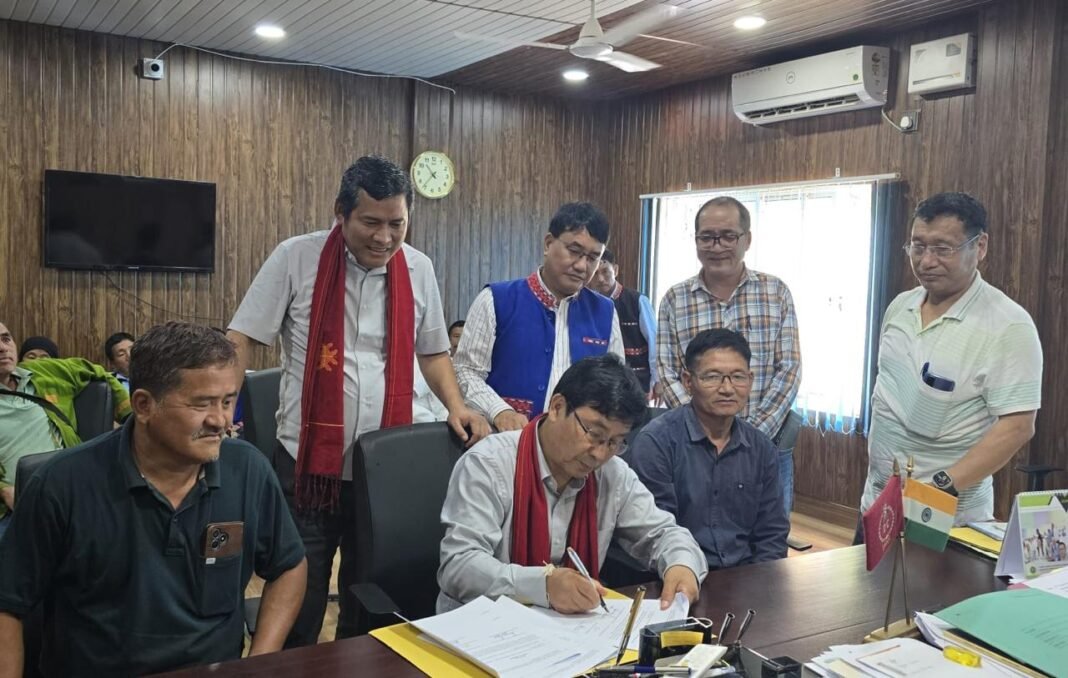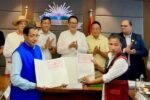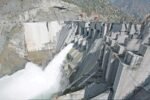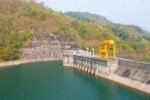HT Bureau
NAMSAI, May 23: In a significant stride towards ensuring water security, regional development, and national strategic resilience, the villagers of Pangkang (Kumku) in Siang District have formally partnered with the Government of Arunachal Pradesh through the signing of a Memorandum of Understanding (MoU) to initiate the Preliminary Feasibility Report (PFR) for the ambitious Siang Upper Multipurpose Project (SUMP).
The ceremony, set against the pristine natural beauty of the Siang Valley, was more than a procedural formality—it symbolized a landmark moment in government-community collaboration. The event underscored the collective vision for long-term socioeconomic development, while also serving as a strategic move in response to broader regional challenges related to water governance and national security.
The signing of the MoU was witnessed by several dignitaries and senior officials. Among those present were Hon’ble Minister for Panchayati Raj, State Transport and Cooperation, Shri Ojing Tasing, Joint Secretary for Hydro Power, Shri Hage Lailang, Chief Engineer of Hydropower, Shri Atek Miyu, and BJP Arunachal Pradesh General Secretary and Special Emissary of the Government, Shri Nalong Mize. Representing the local community were village leaders Shri Taba Tamut and Shri Bakin Tali, who signed the MoU on behalf of the people of Pangkang (Kumku), reflecting the consensus and support of the majority of villagers.
The Deputy Commissioner of Siang District, Shri P N Thungon, signed the MoU on behalf of the state government. Speaking on the occasion, DC Thungon praised the villagers for their vision, wisdom, and maturity, emphasizing that their cooperation represents a new chapter in participatory development and responsible stewardship of natural resources. “This is not only about power or water. It is about harnessing the potential of River Siang for the collective prosperity of the local area, the state, and the nation,” he stated.
According to the provisions laid out in the MoU, the government will roll out a development package worth ₹5 crore over a period of three years. A Village Development Committee (VDC), comprising members from families likely to be affected by the proposed project, will be constituted to manage and implement various welfare schemes under this package. These initiatives are aimed at enhancing village infrastructure, improving health services, and generating sustainable livelihoods, ensuring that the community remains at the heart of the development process.
Importantly, the MoU guarantees continued engagement with local stakeholders throughout the progression of the project. This reflects the government’s commitment to inclusive planning, where the voices, concerns, and aspirations of the local population are incorporated into all stages of project development.
While the project remains in the feasibility assessment phase, the SUMP is widely regarded as a multi-dimensional initiative. It holds the promise of not only clean and sustainable hydroelectric energy but also regional economic upliftment. In addition, it is strategically conceived to counterbalance the rapid construction of dams by China on the upstream Yarlung Tsangpo (known downstream as the Siang River in India). With growing concerns over the geopolitical implications of upstream water infrastructure in Tibet, the SUMP is envisioned as a critical buffer—helping to mitigate the risks of sudden water discharges, regulate seasonal river flow, and support agricultural productivity, drinking water supply, and ecological stability in India’s Northeast.
The signing of the MoU marks a vital step in exploring the viability of what could become a transformative project for Arunachal Pradesh and beyond. It demonstrates the potential of government-community cooperation in tackling both local development challenges and strategic national concerns through responsible and visionary planning.
As preparations for the PFR commence, the mood in Pangkang (Kumku) is one of cautious optimism, rooted in the belief that development, when inclusive and transparent, can bring sustainable prosperity without compromising community interests or environmental values.












